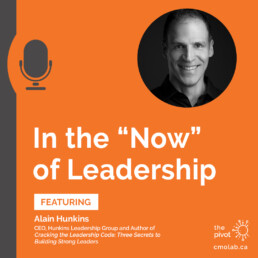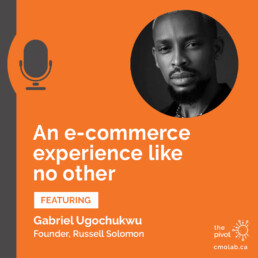The Pivot – Lisa Covens
In this episode, we’re joined by Lisa Covens, Vice President at Canadian owned market research and analytics company, Leger.
In recent years there has been a growing demand for data driven marketing solutions, which has only increased with the societal shifts triggered by the pandemic crisis. To build effective marketing strategies and successfully reach target audiences, it’s essential to know how research trends are changing and how to find quality data.
Tune in to hear Ken and Lisa discuss how the rise of AI has changed data collection and what marketers can expect working with market research and analytics companies in the months and years to come.
Guest Bio: Lisa Covens is Vice President at Leger, the largest Canadian owned market research and analytics company in Canada. With over two decades of experience focusing on research for the purpose of public relations campaigns, Lisa shared her insights on changing trends in research and analytics.
Hear from Canadian senior marketers on The Pivot, talking about our CMO Lab research and how they, like you, are adapting.
In the "Now" of Leadership
In a year that has brought on new challenges for industries across the globe and completely changed the way we work in teams; has the way we lead changed? And what does it take to be an effective leader today?
Find out in this latest episode of the Pivot where Ken is joined by Alain Hunkins to open the curtains on leadership in 2021.
Alain is the CEO of Hunkins Leadership Group and recent author of Cracking the Leadership Code: Three Secrets to Building Strong Leaders. With 20+ years of leadership coaching under his belt, Alain shares his insights on how leaders can build collaborative workforces, why leaders must make their implicit assumptions explicit, and how intention plays a role in more effective leadership.
Whether you’re heading an organization or just looking for a new way to better your leadership in your everyday, tune in!
The TikTok Generation
In the past year and a half, the growth of TikTok has been explosive, with Generation Z dominating its user base. Many have turned to TikTok as their main source of entertainment during the pandemic, and now brands are starting to catch on.
Angela Nader, Head of Beauty and Luxury Partnerships at TikTok joins us in this episode to discuss how brands can be successful on the platform, the companies she feels are doing it right, and how brands need to shift their marketing strategies to cater to well-informed and well-researched Generation Z.
The views, thoughts, and opinions expressed by Angela in this episode of The Pivot are entirely her own and have zero affiliation with TikTok and are not representative of the views of the company.
A marketer’s role in DEI efforts for brands
Some may have the perception that the “marketing” of DEI initiatives is – by default – performative… but is it?
As discussed in previous episodes, marketers and communicators need to have a seat at the table, this is especially relevant when it comes to DEI efforts. How can brands effectively tap into the expertise of marketers when it comes to marketing DEI?
Tune in as we discuss this and more with Susan Diaz, CEO and Editor-in-Chief at c+p digital and Rohini Mukherji, Vice President of Integrated Communications at APEX PR. Susan and Rohini co-host the recently-launched podcast, ABCDEI, which explores the topics of diversity, equity and inclusion through stories of distinct and powerful lived experiences.
Communicators as the conscience of a brand
Any brand’s effort to gain public trust and maintain its reputation is a never-ending cycle, and if the last year has taught us anything, its that communicators need to have a seat at the table. As we continue to navigate a global pandemic and ongoing social justice issues, marketers and communicators have risen to the challenge in an effort to adapt to the situation quickly, and help inform decisions to maintain public trust.
In this episode of The Pivot, we chat with Russell Baker, president of IABC/Toronto. Part of his mandate is to modernize the Toronto Chapter – by placing an emphasis on data to help inform decisions. Tune in to hear the discussion on Russell’s mission to modernize the profession, the IABC’s DEI initiatives, and his key learnings on being a communicator during the pandemic.
Keeping up the dialogue on DEI
When thinking about initiatives to foster a more diverse and inclusive workplace, it’s promising to see that it’s become more of a priority for brands and organizations. The ongoing conversation of DEI will only lead to tangible change – and we remain optimistic it will lead to more representation of diverse voices.
In this episode of The Pivot, we chat with Cam Gordon, head of communications at Twitter Canada, and founder of The Communicators Collective. We’re also joined by Oindrila Hazra, a member of the collective and communications manager of Softchoice. Tune in to hear the discussion on DEI in communications, the need for diversifying who we communicate to, and how driving inclusion can empower employees. Plus, Oindrila shares her hard fought journey to landing a job in communications after immigrating to Canada from India.
Founded in 2020, The Communicators Collective is based on the need to better reflect the diversity of our country in terms of its culture, demographics, and geography in our sector. The collective is also fostering open access to tools, networking opportunities, and dialogue among communicators from all levels and background.
Why we need mentors, especially now
Representation matters. No matter what industry, having diverse voices and leaders shows there’s a path to leadership for all. When it comes to mentorship, there’s a ton of value in having young professionals of diverse backgrounds having a mentor who looks like them and may have shared similar experiences. And for this to happen, we need platforms that bring people together to share their experiences, especially in a time where we may feel more disconnected from our peers more than ever.
In our first episode of Season 5 of The Pivot, we’re joined by Daanish Ahamed, Founder of PR Ramp, to discuss the inspiration behind PR Ramp, creating its flagship mentorship program and the importance of having diverse voices speak about their experiences to up and coming communications students.
PR Ramp, a Toronto-based public relations association helping students and recent grads jump start their career in communications. Founded in the summer of 2020, PR Ramp’s flagship mentorship program connects newcomers with communication practitioners for a one-hour session over Zoom.
An e-commerce experience like no other
In the spirit of staying connected to the wider world (as we continue to stay put in our ever-shrinking ‘bubbles’), Ken re-tells his story of a recent online purchase from Nigeria-based menswear line, Russell Solomon. The customer experience from the brand was both unusual and exceptional – what started out as a purchase from the website, resulted in a conversation via Instagram DMs between Ken and the team at Russell Solomon.
Today, Russell Solomon founder, Gabriel Ugochukwu, joins on us on this episode of The Pivot. Tune in to hear about the initial meeting between Gabriel and Ken, establishing the Russell Solomon aesthetic and how it has evolved overtime, and the inspiration behind the new Russell Solomon collection, AFLOAT.
Why location data matters
A discussion on using data to understand our neighbourhoods
There’s a lot to consider when going through the home buying process, one of the most significant being location. Location not only impacts price, and the scale of the investment, but also quality of life. So how can technology play a role in the decision making process when it comes to enhancing our quality of life? After all, technology has transformed the way in which real estate is build, bought and sold.
In this episode, we’re joined by Vincent-Charles Hodder, co-founder and CEO of Local Logic, and head of marketing, Jillian Ruiz. Local Logic is a real estate AI company providing an innovative approach to buying and selling by applying location based data and algorithms to change the way cities are built and real estate decisions are made. Tune in to hear our discussion on Canadian real estate in the pandemic era, infrastructure and its impact on local businesses, and factors in a neighbourhood that contribute to our quality of life.
Exploring the mindset of younger generations
A conversation on marketing amidst entrenched and systemic social challenges, juxtaposed with the profound potential of Generation Z and Alpha to lead a new era in creative creation.
Today, marketers are being stretched like never before. Not only are they trying to sustain brand relevance in this crisis, but they are now tasked with navigating entrenched social issues that no campaign will ever do justice to.
But if we look to generation Z, and even generation alpha, there is some hope. Generation Z are confident creators and less burdened with self-conscious expression, but for this potential to blossom, they need the financial independence and liberty to truly unleash their creativity, business savviness and activism.
In this episode of The Pivot, we’re joined by Sabaa Quao, Co-founder at Wealthie Works Daily, to discuss the shifting consumer mindset in the midst of the pandemic, how the digitization of money count present risks to younger generations and the need for persistent and consistent financial literacy.










